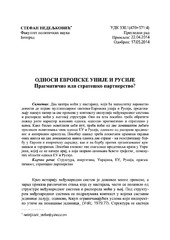Prikaz osnovnih podataka o dokumentu
Relations between the European Union and Russia
Odnosi Evropske unije i Rusije - pragmatično ili strateško partnerstvo?
| dc.creator | Nedeljković, Stevan | |
| dc.date.accessioned | 2021-04-02T12:09:28Z | |
| dc.date.available | 2021-04-02T12:09:28Z | |
| dc.date.issued | 2014 | |
| dc.identifier.issn | 1820-4589 | |
| dc.identifier.uri | http://rfpn.fpn.bg.ac.rs/handle/123456789/476 | |
| dc.description.abstract | This article is analysing the very core of the contemporary EU Russia relations. This essay highlights some fundamental principles which, combined together, are essential for the EU-Russia relations. The analysis goes from the structuralist approach in international relations, considering the two essential dimensions and outcomes of this approach-the possibility of socialization and the possibility of competition between the actors in international relations. The first dimension of EU Russia relations was present during the 90's, and the second has been present since Putin became the leader of Russia, that is since 1999. The EU was working closely with its partners in the West in socialization of Russia and bringing Russia to the rules of the Western civilization. It gave Russia about 2 billion dollars, demanding that Russia implement huge reforms. Russia was on its knees at that time. But, the rules then changed. Russia began to exploit its natural resources, especially gas and oil, and it became the first trade partner of EU. Now EU became dependent on Russia, and Russia used this chance very well. The value approach in their relations stopped being essential and at that moment we had a new dimension of those relations the interest dimension. In order to give the answer to our question, that is, whether the EU-Russia relations are pragmatic or strategic, we start our analysis in the second part of this work, by going through occasional clashes between EU and Russia. From 2000 to the present day, we have the strategic dimension of their relations and the main focus of this part of the analysis is on the disputes regarding energetics and the crisis in Ukraine. These two spheres of interest are essential because the member-states of EU have different approaches and opinions towards Russia Those countries that are closer to Russia, especially the countries in Central and Eastern Europe, don't want to see Russia as the main partner of EU, because of their difficult experience with the Soviet Union. And those countries that are dependent on the Russian gas, especially Germany, the Netherlands and France, do want Russia as their main partner and they don't want to impose some serious sanctions against it regarding the current crisis in Crimea and Eastern Ukraine. This work is analysing the purpose of the present sanctions against Russia and their effect on mutual relations, especially in the light of the absence of unanimity in EU and its partners in the West. | en |
| dc.description.abstract | Dva centra moći u nastajanju, koji će naposletku verovatno dovesti do pojave multipolarnog sistema-Evropska unija i Rusija, predstavljaju lakmus papir za sve promene u kontekstu evolucije međunarodnog sistema i rasporeda moći u njegovoj strukturi. Ono na šta posebno treba obratiti pažnju jeste karakter njihovih odnosa, odnosno pragmatično i strateško u njima. Kako bismo osvetlili sebi put, treba poći od dve dominantne debate prilikom ispitivanja tipa odnosa EU i Rusije, odnosno od rasprava vrednosnog i interesnog pristupa. Posebnu pažnju treba posvetiti primeni tvrdnji ovih škola na dva dominantna nivoa odnosa dve strane - na geostratešku borbu u Evropi i energetsku saradnju, kao i na borbu protiv organizovanog kriminala i terorizma. Poseban element ove slagalice predstavlja kriza u Ukrajini, kojoj se ne nazire kraj, a koja zapravo sačinjava 'sveto trojstvo' pomenutih oblasti odnosa EU i Rusije. | sr |
| dc.publisher | Kultura - Polis Novi Sad i Institut za evropske studije, Beograd | |
| dc.rights | openAccess | |
| dc.source | Kultura polisa | |
| dc.subject | structure | en |
| dc.subject | energy | en |
| dc.subject | Ukraine | en |
| dc.subject | EU | en |
| dc.subject | Russia | en |
| dc.subject | pragmatism | en |
| dc.subject | strategic partnership | en |
| dc.subject | struktura | sr |
| dc.subject | energetika | sr |
| dc.subject | Ukrajina | sr |
| dc.subject | EU | sr |
| dc.subject | Rusija | sr |
| dc.subject | pragmatičnost | sr |
| dc.subject | strateško partnerstvo | sr |
| dc.title | Relations between the European Union and Russia | en |
| dc.title | Odnosi Evropske unije i Rusije - pragmatično ili strateško partnerstvo? | sr |
| dc.type | article | |
| dc.rights.license | ARR | |
| dc.citation.epage | 246 | |
| dc.citation.issue | 24 | |
| dc.citation.other | 11(24): 229-246 | |
| dc.citation.rank | M51 | |
| dc.citation.spage | 229 | |
| dc.citation.volume | 11 | |
| dc.identifier.fulltext | http://rfpn.fpn.bg.ac.rs/bitstream/id/307/473.pdf | |
| dc.identifier.rcub | https://hdl.handle.net/21.15107/rcub_rfpn_476 | |
| dc.type.version | publishedVersion |

